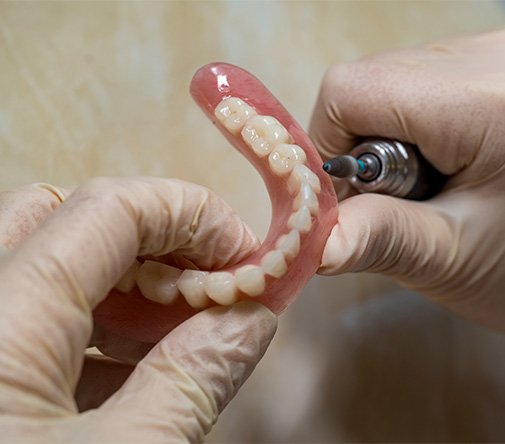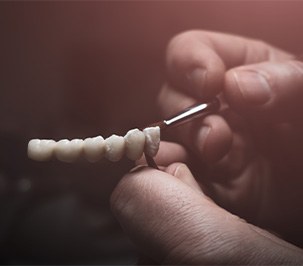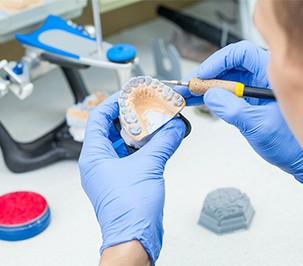Dentures – Marysville, OH
Rebuild a Beautiful Smile

Countless millions of people are suffering with the effects of extensive tooth loss. Fortunately, the team at Darby Creek Dental in Marysville offers a number of tooth replacement solutions that can help you to rebuild a beautiful smile. Are you interested in learning how dentures might be able to benefit you? This page provides some valuable information. After you read it, call our office to book a consultation. We look forward to serving you!
Why Choose Darby Creek Dental for Dentures?
- High-Quality Materials & Top-Quality Care
- Experienced & Compassionate Dental Team
- Customized for Each Unique Patient
Who’s a Good Candidate for Dentures?

No matter how many teeth you are missing, almost anyone can get dentures. First, you will need to schedule a consultation with your dentist. They will be able to determine whether you are eligible for this tooth loss solution. If you don’t currently make a good candidate, you may be able to become one by restoring the health of your gum tissue and bone structure through preliminary treatments.
Effects of Missing Teeth

There are all sorts of things that can cause tooth loss. The most common include tooth decay, gum disease, and trauma. According to the American Academy of Periodontology, this can lead to numerous negative consequences, including facial sagging, difficulty speaking, trouble eating, and lower self-esteem. By opting for dentures to replace your missing teeth, you can improve every single one of these consequences and enjoy a better quality of life.
What Qualifies You for Dentures?

Dentures are ideal for patients who have experienced significant tooth loss but have healthy gum tissue and a sufficient jawbone. Those who receive dentures must also be committed to their dental hygiene routine and willing to properly care for their dentures and their mouth.
The number of teeth you are missing will ultimately determine which type of denture is best for you. Dentures are more affordable than other tooth replacement options, like dental implants. This makes them ideal for patients who are unable to invest a lot of money into their smile at this time.
Alternative Tooth-Replacement Options

If you aren’t a good candidate for dentures, you can explore other tooth replacement options that we offer. You may prefer one of the following:
- Dental Bridges: Dental bridges work by “bridging” the gap where your tooth once was. They are great for patients who are only missing one or a few teeth. They require healthy teeth surrounding the space to support the bridge.
- Dental Implants: A dental implant is a titanium post that’s surgically inserted into the jawbone. For this tooth-replacement option, it’s important that the patient has a solid bone structure. Dental implants are more costly than traditional dentures, but they are meant to last for several decades or even the rest of your life.
Types of Dentures

When you visit us for your consultation, we will learn the details of your situation. For example, we will examine your gums, your jawbone, and your remaining natural teeth. Based on what we discover, we will recommend the type of denture that we believe will work best for you.
Partial Dentures

Partial dentures fit in around the remaining natural teeth, sort of like a puzzle piece that goes exactly where it is needed. They consist of acrylic or porcelain teeth attached to an acrylic base. Small metal or acrylic clips help them to stay in place during eating and speaking.
Full Dentures
A full denture replaces an entire arch of missing teeth. It usually has an acrylic gum-colored base that supports acrylic or porcelain teeth. Dentures are designed to rest comfortably on the gums; they may be helped to stay in place by natural suction or a mild adhesive.
Implant Dentures

Instead of relying on suction or adhesive to stay in place, implant dentures are anchored in place via dental implants, which act as prosthetic tooth roots. They bond with the jawbone and provide an incredibly sturdy base of support for the teeth on top of them, making them the best form of tooth replacement.
How Dentures Are Made

All of our dentures are custom-made for each patient. After all, everyone’s mouth is entirely unique, so a high-quality prosthetic needs to be specialized. This is why getting dentures requires a multi-step process and some help from the dental lab. Continue reading to learn more about what makes up dentures and the entire process.
What Are Dentures Made Of?

Dentures are comprised of two separate parts: the base and the replacement teeth. Here’s a closer look at each of them and their functions:
- Base: The base is the foundational structure of the replacement teeth. It can be made from a variety of materials, but acrylic tends to be the most popular because it can be made to look very similar to natural gum tissue.
- Teeth: Most of the time, the replacement teeth attached to the base of the denture are crafted from resin or porcelain. This is because both of these materials look very similar to real tooth enamel. They even reflect light in a similar way.
The Denture Creation Process

No two dentures are the same. The creation process is made up of multiple steps. Everyone’s treatment will look a little bit different, but here’s what you can generally expect:
- First, measurements are taken of your jaw and impressions of your upper and lower gums. These impressions are used to create a plaster model of your mouth.
- The model is sent to the dental laboratory, where the dentures are made. First, your replacement teeth are set into place using a mechanical device called an “articulator.” Adjustments are then made by a lab technician.
- The wax dentures are sent back to your dentist for a fitting. If everything looks and feels great, they are returned to the dental lab to complete the rest of the process.
- After your dentures are returned to the lab, the wax needs to be replaced with acrylic. To do this, the lab technician placed the dentures into a flask. Plaster is then poured into the flask to maintain the shape of the dentures. The entire flask is placed into hot water to melt away the wax.
- The plaster is cut from the dentures using dental tools. Then, the dentures are placed into an ultrasonic bath to wash away the rest of the plaster.
- Excess acrylic is cut from the dentures. Then, the dentures are polished to perfection.
- Now that your dentures are complete, it’s time to return to our practice to give them a try.
- If both you and your dentist are happy with the final results, you can leave showing off your completed smile with pride!
Adjusting to Your New Dentures

After you get your dentures, you will likely experience some minor soreness and discomfort, but this is perfectly normal as your mouth adjusts to your new prosthesis. Your dentures will start to feel more and more natural over time. When you first get your dentures, it’s a good idea to stick to softer foods and exercise your facial muscles. If discomfort persists or you have other concerns about your replacement teeth, give us a call so we can help.
The Benefits of Dentures

Dentures offer some remarkable benefits:
- They are customized for each patient, so you can expect your prosthetic to fit comfortably and function well.
- They can enable you to eat a wide variety of foods, including highly nutritious items like fruits and veggies.
- They are a wonderful monetary value that can provide you with years of reliable function.
- They are easy to care for. As long as you maintain excellent oral hygiene, attend regular dental visits, and take other reasonable precautions, you can expect them to stay in good shape.
Understanding the Cost of Dentures

Your financial situation should never prevent you from replacing your lost teeth. Many things influence the cost of dentures, but Darby Creek Dental has the solutions you need to keep a new set of teeth within your budget. You won't have to compromise quality, comfort, or aesthetics to keep dentures affordable. You can invest in a complete, beautiful smile without breaking the bank.
Factors That Affect the Cost of Dentures

There's no one-size-fits-all denture because every mouth is unique. Not to mention, every situation differs. Several factors affect the cost, including:
- Consultation: You'll require a consultation to ensure dentures are the right choice for you.
- Preparatory Procedures: You may require a little prep work, like tooth extractions or gum disease therapy.
- Type of Denture: Depending on the severity of tooth loss and preferences, you have many styles of dentures to choose from.
- Materials: Discounted materials may cost less, but high-quality options can be more aesthetically pleasing, comfortable, and durable.
After examining your mouth, your dentist will create a personalized treatment plan and provide you with an estimate. They will review the fees, so you'll know exactly what you'll need to pay before committing to anything.
Are Implant Dentures More Expensive?

Implant dentures cost more initially, but they are the most affordable overall. Unlike a traditional denture that needs to be replaced every few years, dental implants can last for 30 years or more. They have over a 95% success rate and are the only method to replicate both the tooth roots and the crowns. This creates the next best thing to your real teeth. Implant dentures will preserve your jawbone to maintain a youthful appearance and improve your dental health. You'll save money down the road and enjoy priceless benefits not possible with a traditional denture.
Does Dental Insurance Cover Dentures?

Most dental insurance can be used to lower the amount you will pay out-of-pocket. Besides your consultation and any diagnostic services, your policy can cover 50% to 80% of the expenses for preparatory procedures and your dentures after meeting your annual deductible. We will work on your behalf with your dental insurance to maximize your yearly allowance.
Other Options for Making Dentures Affordable

Our office provides various solutions to keep dentures affordable for everyone, including:
- Traditional Payments: Darby Creek Dental accepts cash, credit cards, and personal checks.
- Dental Financing: You can pay any out-of-pocket expenses using monthly installments with CareCredit. Based on your credit approval, you can benefit from little or no interest in financing.
- Special Offers: Our office offers regular promotions for select services. A member of our office will review any ongoing specials.
Denture FAQs
Do Dentures Break Easily?
While dentures are manufactured to be incredibly durable, they are not invincible and do not last forever. With excellent care, your appliance may last between five and seven years, but accidents happen occasionally. A common reason for dentures to break is for them to be dropped while their wearer is removing, inserting, or cleaning them. Dentures may also break or fracture if they do not fit properly or if they have small flaws such as scratches or notches in their bases. Even if your dentures receive the best care, they can eventually become worn down due to years of stress from repeated use.
What Should You Do if Your Dentures Break?
The most serious damage a full denture can experience is “prosthesis fracture,” meaning that it has broken in half. While this issue is more common for top dentures, it can happen to a bottom one as well. We may be able to repair your appliance depending on how it broke and how severely it is damaged, but it’s important to inform us as soon as you notice any problems. In some cases, we can fix a damaged denture in a single visit, but we may need to send it to a trusted dental lab for repair in others. If your denture is broken beyond repair, we may need to recommend replacing it altogether.
Can Dentures Lose Their Fit?
Since each denture is customized to fit the patient’s mouth, your appliance should fit extremely well when you first start wearing it. However, dentures can lose their fit over time due to wear and tear and the changing shape of the mouth. Since these appliances do not address the underlying problem of bone erosion in the jaw after tooth loss, your prosthetic device may no longer fit well after several years of use. Ill-fitting dentures can lead to a variety of oral health issues such as sore or swollen gums, bad breath, speaking difficulties, or bleeding gum tissue. If your dentures are no longer fitting well, bring them to our office in Marysville. There, our dentist can perform a reline or another reparative procedure to make them fit well again, or they may recommend replacing the appliance completely. If you are between replacements, you may find that using denture adhesive helps you wear your appliance more comfortably.
Can I Sleep with My Dentures?
When you first receive your dentures, you will probably be instructed to wear them for 24 hours, including while sleeping. After that, it’s important to remove your dentures for at least eight hours every day so your mouth can rest and clean itself, and most patients do this before bed. Wearing dentures restricts blood flow to your gums, making it harder for them to heal and fight infections while possibly contributing to jawbone erosion, and the dark, damp space between the appliance and the gums provides the ideal area for harmful oral bacteria to thrive and multiply rapidly. Continuous denture wear is associated with a range of oral health issues such as poor oral hygiene, gum disease, soft-tissue irritation, and a higher risk of pneumonia.

